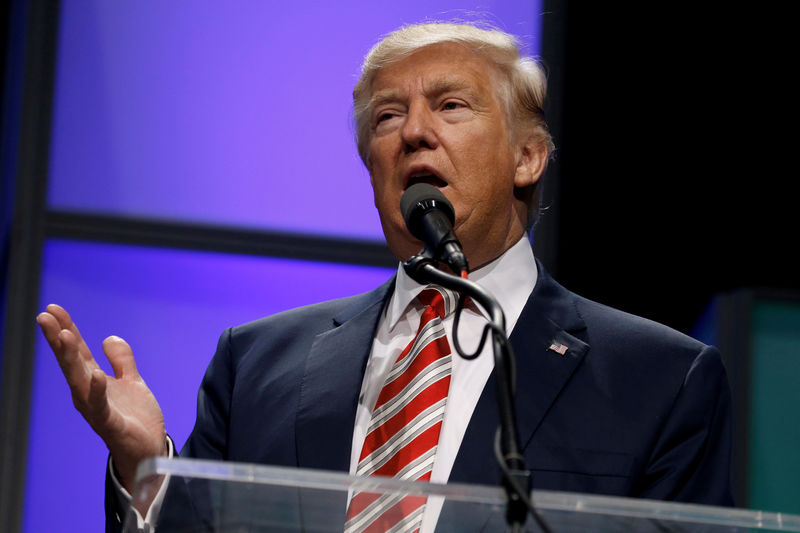By David Brunnstrom
WASHINGTON (Reuters) - Japanese Prime Minister Shinzo Abe will seek reassurances from U.S. President-elect Donald Trump on U.S.-Japan ties on Thursday and a senior adviser to Abe said he had been told that campaign remarks calling the alliance into question should not be taken literally.
Abe is due to meet Trump in New York on Thursday and is expected to be the first foreign leader to meet the president- elect since his election last week.
Trump's transition team has not responded to requests for comment on the meeting, but an adviser to Trump, speaking anonymously, said this week that Trump would seek to reassure Abe and other Asian allies rattled by his campaign rhetoric.
Trump had fanned worries in Tokyo and beyond with his comments on the possibility of Japan acquiring nuclear arms and demands that allies pay more for the upkeep of U.S. forces on their soil or face the possibility of their withdrawal.
Katsuyuki Kawai, an adviser to Abe sent to set up the Trump meeting, said he had spoken to several Trump advisers since arriving in Washington on Monday.
"I have been meeting with so many top aides to the president-elect and also I have been meeting with the very distinguished senators and congressmen and they unanimously told me that we don’t have to take each word that Mr. Trump said publicly literally," he told Reuters.
Kawai said that among the Trump advisers he had met were Representative Devin Nunes, Senator Tom Cotton, and the presidents of the conservative Heritage Foundation and Hudson Institute think tanks, Jim DeMint and Ken Weinstein.
Kawai said the fact that Abe would be the first foreign leader Trump would meet since winning the presidency on Nov. 8 was "a meaningful signal" and Abe's aim was "to establish the highest level personal ties with the president-elect."
"That meeting will be the first for building up the great personal relationship between two leaders," he said.
"Prime Minister Abe will definitely talk about the importance of the Japan-U.S. alliance and that alliance is not only for Japan and the United States, but also for the entire Indo-Pacific region as well as world politics."
SETTING THE TONE
A Trump adviser, who did not want to be identified because he was not authorized to speak to the media, said he expected the meeting to "set the tone" for Trump's relations with Japan and the region.
"I think the message ... is going to be extremely reassuring," the adviser said. "I expect he is going to reaffirm his commitments to the alliance and the American commitment to being in the Pacific long-term."
The adviser said Japan's financial support for U.S. troops in Japan might come up but was unlikely to be a focus.
Some diplomats say that until Trump makes key appointments, it will be hard to assess his policies on issues ranging from overseas deployments of U.S. troops, China's maritime aggressiveness in Asia and North Korea's nuclear threat.
A day before the Trump-Abe meeting, Japanese officials said they had no idea exactly when the meeting would take place, where in New York it will happen, who will be invited or whom to call for answers.
Japanese and U.S. officials said on Wednesday the State Department had not been involved in planning the meeting, which has left the logistical and protocol details that normally would be settled weeks in advance still to be determined.
“There has been a lot of confusion,” said one Japanese official.
Abe, a political blue blood and veteran lawmaker, and Trump, a brash outsider with no diplomatic or government experience, have sharp differences on policy issues such as free trade.
But the two may find they have much in common, including pledges to restore their countries’ global stature and a desire to counter a rising China while improving relations with Russia.
"Prime Minister Abe and Mr. Trump will have good chemistry," said Takashi Kawakami, a professor at Tokyo's Takushoku University. "Both tend to decide and act based on intuition. And both are pragmatists who put their countries' interests first."
Kawai said Abe considered the U.S. relationship Japan's most important and that it was essential that it was built on trust.
"That is why the prime minister wants to build the highest level personal ties with Mr. Trump," he said.
Some of Trump's rhetoric suggests an image of Japan forged in the 1980s, when Tokyo was seen by many in the United States as a threat to jobs and a free-rider on defense.
His election also has dashed hopes for U.S. approval of a 12-nation trade pact, the Trans-Pacific Partnership (TPP), a linchpin of Washington's "pivot" to Asia and a pillar of Abe's economic reforms.
But Abe's personal attitude about defense appears to be viewed more positively in the Trump camp, even if it would like Japan to do more.
Since taking office in 2012 Abe has boosted Japan's overall defense spending while stretching the limits of its pacifist post-war constitution to allow the military to take a bigger global role.
"Frankly, the prime minister has been more assertive and forthright in trying to make those changes to Japan’s global posture," the Trump adviser said. "I think he’s going to get a very receptive audience there."
Japan agreed last December to boost spending for U.S. forces in Japan by 1.4 percent for the next five years, at an average of 189.3 billion yen ($1.74 billion) per year. Defence Minister Tomomi Inada has said Tokyo was paying enough.
However, defense spending still stands at just over 1 percent of GDP against over 3 percent in the United States.
